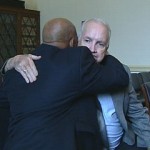Mon 11 Jan, 2010
Harry Reid and light-skinned Negroes
Comments (2) Filed under: Politics| Tags: Barack Obama, Civil rights movement, Harry Reid, Negro, Traces of the Trade, Trent Lott, U.S. Senate |
 Yesterday, the blogosphere erupted in a firestorm of controversy over remarks by Senate Majority Leader Harry Reid (D-Nev.) in 2008 that then-presidential candidate Barack Obama was “light-skinned” and spoke “with no Negro dialect.”
Yesterday, the blogosphere erupted in a firestorm of controversy over remarks by Senate Majority Leader Harry Reid (D-Nev.) in 2008 that then-presidential candidate Barack Obama was “light-skinned” and spoke “with no Negro dialect.”
This is the second time in recent weeks that Senator Reid has found himself in hot water over issues relating to slavery and race. Last month, Reid drew controversy for comparing Republican opponents of health care reform to those who resisted abolishing slavery.
This time, he is facing calls from Republicans to step down as majority leader because of ill-considered remarks about the leader of his own party.
Reid’s comments were revealed in a new book about the 2008 presidential campaign, entitled Game Change: Obama and the Clintons, McCain and Pain, and the Race of a Lifetime, by Mark Halperin and John Heilemann. In the book, the authors say that while Reid was officially neutral in the primary fight between Obama and then-Senator Hillary Clinton, in private he was “unequivocal” in his encouragement of Obama:
He was wowed by Obama’s oratorical gifts and believed that the country was ready to embrace a black presidential candidate, especially one such as Obama — a “light-skinned” African American “with no Negro dialect, unless he wanted to have one,” as he said privately. Reid was convinced, in fact, that Obama’s race would help him more than hurt him in a bid for the Democratic nomination.
This passage from the book appears to have been reported first by The Atlantic on Friday, and Senator Reid apologized for his choice of words on Saturday.
What, exactly, is this controversy about?
